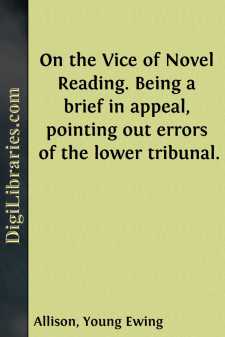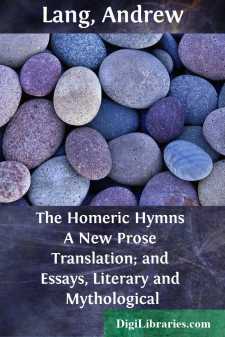Literary Criticism
- American 18
- Ancient and Classical 3
- Asian 1
- Australian & Oceanian 1
- Books & Reading 8
- Caribbean & Latin American 2
- Drama 2
- English, Irish, Scottish, Welsh 49
- European 7
- General 37
- Horror 1
- Humor 2
- Jewish 2
- Medieval 2
- Middle Eastern 3
- Poetry 7
- Renaissance 6
- Russian & Former Soviet Union 1
- Shakespeare 27
Literary Criticism Books
Sort by:
by:
Samuel Johnson
Dr. Johnson's Preface to Shakespeare is one of the most famous critical essays of the eighteenth century, and yet too many students have forgotten that it is, precisely, a preface to the plays of Shakespeare, edited by Dr. Johnson himself. That is to say, the edition itself has been obscured or overshadowed by its preface, and the sustained effort of that essay has virtually monopolized scholarly...
more...
by:
Nahum Slouschz
INTRODUCTION It was long believed that Hebrew had no place among the modern languages as a literary vehicle. The circumstance that the Jews of Western countries had given up the use of their national language outside of the synagogue was not calculated to discredit the belief. The Hebrew, it was generally held, had once been alive, but now it belonged among the dead languages, in the same sense as the...
more...
PREFACE. ore than twenty years have passed since my revered friend Bunsen called me one day into his library at Carlton House Terrace, and announced to me with beaming eyes that the publication of the Rig-veda was secure. He had spent many days in seeing the Directors of the East-India Company, and explaining to them the importance of this work, and the necessity of having it published in England. At...
more...
by:
Lafcadio Hearn
Introduction These chapters, for the most part, are reprinted from Lafcadio Hearn’s “Interpretations of Literature,” 1915, from his “Life and Literature,” 1916, and from his “Appreciations of Poetry,” 1917. Three chapters appear here for the first time. They are all taken from the student notes of Hearn’s lectures at the University of Tokyo, 1896-1902, sufficiently described in the...
more...
INTRODUCTION. My publisher must take at least some of the responsibility for reviving these essays. All bear the marks of the period at which they were written; and some of them deal with the beginnings of movements which have since grown to much greater strength, and in growing have developed new characteristics at the expense of what was originally more prominent. Other pages, again, take no account...
more...
INTRODUCTION. In the latter part of the seventeenth century, and during nearly the whole of the eighteenth, the literature of Rome exercised an imperial sway over European taste. Pope thought fit to assume an apologetic tone when he clothed Homer in an English dress, and reminded the world that, as compared with Virgil, the Greek poet had at least the merit of coming first. His own mind was of an...
more...
by:
Samuel Johnson
TRAGEDIES Vol. IV (392) Most of the notes which the present editor has subjoined to this play were published by him in a small pamphlet in 1745. I.i (393,*) Enter three Witches] In order to make a true estimate of the abilities and merit of a writer, it it always necessary to examine the genius of his age, and the opinions of his contemporaries. A poet who should now make the whole action of his...
more...
ON THE VICE OF NOVEL READING. Ever since the Novel reached the stage of development where it was demonstrated to be the most ingenious vehicle yet designed for conveying the protean thought and fancy of man, there has stood in the judgment book of Public Opinion the decree that novel-reading was a vice. Of course, that judgment did not apply exclusively to the reading of novels. It was a sort of...
more...
by:
Andrew Lang
ESSAYS INTRODUCTORY THE SO-CALLED HOMERIC HYMNS “The existing collection of the Hymns is of unknown editorship, unknown date, and unknown purpose,” says Baumeister. Why any man should have collected the little preludes of five or six lines in length, and of purely conventional character, while he did not copy out the longer poems to which they probably served as preludes, is a mystery. The...
more...
by:
John Dennis
INTRODUCTION. The death of John Dryden, on the first of May, 1700, closed a period of no small significance in the history of English literature. His faults were many, both as a man and as a poet, but he belongs to the race of the giants, and the impress of greatness is stamped upon his works. No student of Dryden can fail to mark the force and sweep of an intellect impatient of restraint. His...
more...











